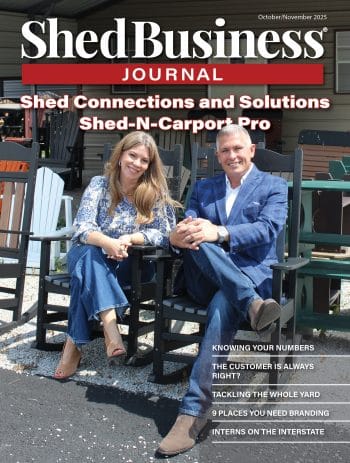
We all use the words “shed industry” to identify our business’ specific involvement with shed building to others. These words are used in a general way to describe where and to whom we sell our products and services. “Shed industry” is our way of defining the umbrella many of our businesses fall under.
But is this correct? Is shed building truly an industry? Economists identify industries in basic terms involving processing raw materials and manufacturing goods in a factory. For instance, the steel industry, the petroleum industry, or the chemical industry are a few of the common, basic industries.
Others describe an industry as a group of businesses that produce a particular type of product or service. For example, the timber industry produces lumber and wood products, the banking industry offers financial services, and the automobile industry builds and sells cars.
Whatever the correct definition is, you get the idea. Similar businesses producing similar products and services can be grouped together for commonality. The list of industries goes on and on, but what is considered a market?
The most common definition of a market involves groups of businesses conducting commerce with one another. Selling and trading products back and forth. For instance, Darren Satsky writes a lumber market column for this magazine that summarizes the trading of lumber. His sole focus is on knowing how lumber is traded and what factors affect the market for lumber.
So, by now you are probably wondering what this has to do with anything.
Shed building is both an industry and a market. What you decide to call it depends on how you are involved.
Where do you fit within this group of businesses that construct, sell or lease, and deliver sheds? Is your company supplying building materials and dimensional lumber to shed builders? Maybe your company offers custom software to design sheds online. Or, maybe you are down the line and haul sheds after they have been built and then sold.
Whatever your niche, your company operates within the scope of one of these.
Central to our industry is the position of shed builder and shed manufacturer. Most builders are stick-framing sheds under a roof with four walls. They employ building techniques similar to residential home construction. A few other builders have adopted manufacturing processes and utilize production tools and equipment to churn out sheds more readily.
Whichever method you use as a builder, it’s what happens next that sets the shed industry apart from other industries. How a shed is sold, paid for, and delivered is remarkable. The coordination between builder, dealer or retailer, rent-to-own company, and hauler is a delicate balancing act that happens thousands of times every week across the country.
Where does your business land? From which position do you navigate the shed industry?
SHED BUILDER & MANUFACTURER
A company that manufactures and constructs sheds that can be delivered via truck and trailer to the end-user. These companies sell their products in one or more of the following methods:
- Retail sales conducted from a company-branded lot or location by an on-site salesperson.
- Sells sheds at wholesale prices to an independent dealer who marks up and resells the shed.
- Consigns sheds to an independent dealer or retailer who earns a commission or fee when a shed is sold.
- Sheds displayed at an unmanned display lot but sold by a salesperson located elsewhere.
- May or may not perform shed delivery and installation.
SHED DEALER
A business that is only involved in the process of marketing, advertising, and selling a shed or other outdoor structure to the end user. A business that does not manufacture or construct the structures that it sells.
- Acquires sheds at wholesale prices from a builder and resell sheds to the end-user at a retail price that includes a margin of profit.
- And/or receives sheds on consignment from a builder and resells sheds to the end-user, thus earning a fee or commission per building sold.
- May or may not perform shed delivery and installation.
SHED RETAILER
A business that is partially involved in shed sales and one or more other commercial enterprises at the same time from the same location.
- Receives sheds on consignment from a builder and earns a fee or commission per building sold.
- Most often does not perform shed delivery and installation.
SHED LOT
A corner lot or busy location where sheds are displayed for passersby to open, inspect, and walk around. A shed lot is a unique marketing concept that is prevalent throughout the shed industry. Usually unmanned, the shed lot is a key method that most shed builders use to present their structures to local prospects.
A shed lot isn’t a type of business as much as a way of doing business. Not to include shed lots in a breakdown of the industry would be an oversight. The importance of the shed lot cannot be understated.
You may be scratching your head saying, “So what, you haven’t told me anything I don’t already know.” And I would agree with you on this point. However, I believe it is important that we begin to identify the many entities, positions, and relationships that make up the shed industry.
Putting this into writing is the first step. Being able to identify where your company falls in the industry is a step toward unifying a group of businesses. Remember, if we are going to call ourselves an industry, or a market, there needs to be some semblance of cohesiveness.
The shed industry is much larger than any one of us realizes. Opportunities abound for everyone. Understanding the overall industry breakdown helps us to plan our unique approach to providing a product or service. We choose our place in the shed industry based on where we’ve been and where we intend on going with the information at our disposal.
It’s my personal goal to see that, as a magazine, we do everything in our power to identify and bring light to the shed industry. A unified industry is one that prospers. I wish everyone a successful future.




